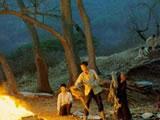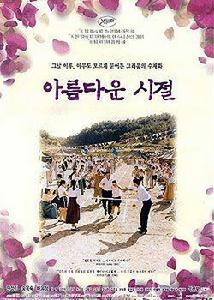 劇照
劇照戰爭使人成長,也使Sung-min的朋友一個一個地消失。這一切一切,都要從1952年的春天開始講起。那一年的春天,難民營學校的老師的父母被殺。營內村民認為兇手是一個同學的父親,因為他是共黨份子。這時距離南北雙方停火差不到快一年,但共黨份子還不時在南方活動。所以大眾都對共黨份子很憎恨,要老師親手殺了他。老師不肯,大伙兒就一擁而上,將他打個半死。老師雖然不忍心殺他,但在課室上卻處處針對他的兒子。最後因為對方沒有錢交學費而被老師趕出學校了。《故鄉之春》是韓國電影中關於朝鮮半島戰爭(1950-1953)的最為人知的一部,但它裡面並沒有出現任何戰爭的殘酷場面,而是聚焦在 ?戰爭時期一個小鎮的男孩眼中的日常生活上。大部分學校照常上課,孩子們一如既往地打鬧。一些不幸的家庭遭受著極度貧困的折磨,讓孩子的母親不得不出賣自己的身體來養活一家人。另一些人卻乘機發著戰爭財,鑽律法的漏洞。電影展示在戰爭的背景之下人們真實的日常生活,讓觀眾更加體會到戰爭的殘酷。
A story of two 13-year-old boys in a small country village during the last days of the Korean War. Sungmin's father gets a job at US army camp through his daughter's American boyfriend, and the family gets richer. But Changhee's father has been long-lost and his mother can't even afford one meal a day for her children. One day, the boys peep into a deserted mill-house which is unofficially used for prostitution, and find out Changhee's mother with a GI soldier. Changhee sets fire to the place and runs away. Months later, Sungmin hears a rumor that his best friend has been killed by a group of angry American soldiers and makes an empty grave with other boys. A year later, Sungmin's father gets fired for stealing things from the camp. Sangmin goes to Changhee's grave to bid farewell and the family leaves the village.

